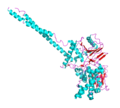Demethylase
Enzyme that removes methyl groups from molecules
Demethylase
Demethylases are a class of enzymes that remove methyl groups from methylated molecules, a process known as demethylation. These enzymes play a crucial role in the regulation of gene expression, epigenetic modifications, and the metabolism of various compounds within the cell.
Function
Demethylases are involved in the removal of methyl groups from DNA, RNA, and histones, which are proteins that help package DNA into chromatin. This process is essential for the regulation of gene expression, as methylation typically acts to repress gene activity. By removing methyl groups, demethylases can activate genes that were previously silenced.
DNA Demethylation
DNA demethylation is a critical process in epigenetics, where demethylases remove methyl groups from cytosine bases in DNA. This can lead to the reactivation of genes that are important for development and differentiation. The TET family of enzymes is known to play a significant role in DNA demethylation.
Histone Demethylation
Histone demethylases remove methyl groups from lysine and arginine residues on histone proteins. This modification can alter the chromatin structure and influence gene expression. The LSD1 and JmjC domain-containing families are well-known histone demethylases.
Types of Demethylases
Demethylases can be broadly categorized based on their substrate specificity and the type of methylation they reverse. Some of the major types include:
- DNA Demethylases: Enzymes like TET1, TET2, and TET3 that are involved in the oxidation of 5-methylcytosine to 5-hydroxymethylcytosine, leading to DNA demethylation.
- Histone Demethylases: Enzymes such as LSD1 (lysine-specific demethylase 1) and the JmjC domain-containing demethylases, which remove methyl groups from histone proteins.
Mechanism
Demethylases typically function by oxidizing the methyl group, which can then be removed as formaldehyde or further processed. The specific mechanism can vary depending on the type of demethylase and its substrate.
Clinical Significance
Aberrant demethylation is associated with various diseases, including cancer, neurological disorders, and autoimmune diseases. Understanding the role of demethylases in these conditions can lead to the development of targeted therapies.
Research and Applications
Research into demethylases is ongoing, with a focus on understanding their role in normal physiology and disease. Inhibitors of specific demethylases are being explored as potential therapeutic agents in cancer and other diseases.
Also see
| Enzymes | ||||||||||
|---|---|---|---|---|---|---|---|---|---|---|
|
Transform your life with W8MD's budget GLP-1 injections from $125.
W8MD offers a medical weight loss program to lose weight in Philadelphia. Our physician-supervised medical weight loss provides:
- Most insurances accepted or discounted self-pay rates. We will obtain insurance prior authorizations if needed.
- Generic GLP1 weight loss injections from $125 for the starting dose.
- Also offer prescription weight loss medications including Phentermine, Qsymia, Diethylpropion, Contrave etc.
NYC weight loss doctor appointments
Start your NYC weight loss journey today at our NYC medical weight loss and Philadelphia medical weight loss clinics.
- Call 718-946-5500 to lose weight in NYC or for medical weight loss in Philadelphia 215-676-2334.
- Tags:NYC medical weight loss, Philadelphia lose weight Zepbound NYC, Budget GLP1 weight loss injections, Wegovy Philadelphia, Wegovy NYC, Philadelphia medical weight loss, Brookly weight loss and Wegovy NYC
|
WikiMD's Wellness Encyclopedia |
| Let Food Be Thy Medicine Medicine Thy Food - Hippocrates |
Medical Disclaimer: WikiMD is not a substitute for professional medical advice. The information on WikiMD is provided as an information resource only, may be incorrect, outdated or misleading, and is not to be used or relied on for any diagnostic or treatment purposes. Please consult your health care provider before making any healthcare decisions or for guidance about a specific medical condition. WikiMD expressly disclaims responsibility, and shall have no liability, for any damages, loss, injury, or liability whatsoever suffered as a result of your reliance on the information contained in this site. By visiting this site you agree to the foregoing terms and conditions, which may from time to time be changed or supplemented by WikiMD. If you do not agree to the foregoing terms and conditions, you should not enter or use this site. See full disclaimer.
Credits:Most images are courtesy of Wikimedia commons, and templates, categories Wikipedia, licensed under CC BY SA or similar.
Contributors: Prab R. Tumpati, MD




